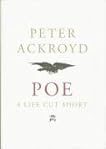Tags
book challenge, book club, books, gothic fiction, HoL, house of leaves, literature, mark z danielewski

After a lengthy hiatus, I have decided to make a return to blogging. What pulls me out of my prolonged absence is a cocktail of slightly unpleasant things that life has thrown at me this week. Thursday especially was a pretty nasty bastard, I’ll have you know.
Here are the ingredients, in case you should want to emulate my Poe-esque misery:
- Add two parts arctic ‘Beast of the East’, by standing out in the freezing cold for 50 minutes. You are not allowed a coat, and should stay there in the whipping rain until your marrow aches with pain, you can’t feel your ears and your nose is dripping like a broken tap.
- This, along with one parts of fatigue, will ferment to produce influenza-like symptoms quite nicely, with a pinch of voice loss to kick-start the whole thing. Fever, in the form of so many Shelobs will insert their pincer-like legs into your shoulders and neck, and if you are lucky, the small of your spine will also host a little succubus intent of riding the hell out of you indefinitely.
- By day 3, your voice has completely gone, or it alternates between a foghorn and the squeak of a teenage boy on the cusp of manhood. It is important that you are bedridden and mentally ‘crawling up the walls’ (a la The Yellow Wallpaper). This means you will do ANYTHING to combat the boredom within and without.
- Day 4 gifts the afflicted with an unbearable itch that pulsates like gamma rays from the INSIDE of ones forehead, just behind the eyes. I call this the ‘Clockwork Orange’ effect. It is okay to want to claw your eyes out, but to no avail. As a bonus, within the ears there is further movement that can only be described as something out of The Wasp Factory. Yes, wasps. Angry ones. In your head. Buzzing. Itching. And no way to itch it…
- Day 5 and you have to do something or you are going to go fairly insane… you are ill, you are missing World Book Day at school (the only time of year that is worth being a teacher at a school), everything you eat tastes like sawdust (oranges mostly). And if that is not enough, there is the grim approach of your 35th birthday, along with the thought of ‘what am I doing with my life?’ What is a girl to do?
So it is with all moments of productiveness, that are spurred on by desperation I find, that something comes to the rescue: The House of Leaves Book Club!
I thought to myself ‘why not?’ After all, it’s been 11 years since I entered that formidable htnirybal House on Ash Tree Lane, 11 years since I experienced quite literally the most powerful piece of fiction I have ever come across. I liked the fact that MZD planned this so close to his birthday, which is close to mine. I liked that it was a gargantuan project (once you fall into the house, there is no coming back out). In short, it felt like fate.
I’m never on time for book clubs, but this one started yesterday. Those taking part should be reading between the dates of 26th February and 3rd March the following:
- Front matter, back cover
- The dedication
- Flap copy
Now, since most people will have different editions (some coloured, some not) you will have to adjust what you read. Since I’ve gone through this monstrosity before and lived to tell the tale, for me it’ll be like entering the Overlook Hotel after Johnny went mental and the place was abandoned for years.
For those who have never read HoL but heard about it, the experience is a completely unique. There isn’t a novel like it, and I liken it to the mad genius of Brett Easton Ellis’ American Psycho, where the novel has a life, will and consciousness (rather a ‘lack of’ of its own).
Those of you who have ever watched Stranger Things, will appreciate how Danielewski takes and uses the many tropes of horror fiction and makes it a thing entirely its own. Where there is the ‘underverse’ in Stranger Things, there is the also the monstrous labyrinth in the house.
FIRST-TIMERS WARNING: This is no spoiler, but if you decide to do the read-along, then you will inevitably run into the CODES – these are secret messages embedded in the text/ footnotes/ margins etc. I shall be periodically posting my thoughts about these as I come across them. If you do not know what I mean by this, check out the official FB website, where the madness has already begun with people cross-referencing like mad between the pages: House of Leaves Book Club.
There is also the real madness of the ‘coding’ forums, which can still be found here: Mark Danielewski Forums (caution upon entry is advised… it can get rather too much in there with the info. Spoiler alert…)
So, I’m off to read the bits assigned and will come back to address the all important question that MZD will be posing, which is:
“How does “This is not for you” apply to the book, the reader, and Johnny Truant?”
Is anyone game to read along with me and throw some theories out there?








